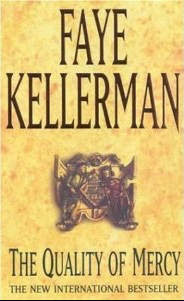When actor Harry Whitman is found near the road with a sword through his back, the obvious conclusion is that he was killed by a highwayman. His friend and protege Will Shakespeare, however, isn’t so sure. Asked by Whitman’s widow to find her husband’s killer, he sets out to investigate and soon finds that his suspicions are justified.
Meanwhile Rebecca, the teenage daughter of the Queen’s physician Roderigo Lopez, is eager to avoid the fate that her gender and class have alotted her: Marriage. Her fiance has been murdered while carrying out her father’s schemes to rescue fellow Jews from the Inquisition, but it is only a matter of time before she is betrothed to another. And Rebecca means to make the most of every moment of freedom she can grab.
I feel a little guilty about including a book I didn’t finish in a challenge, but it’s too late in the year to hunt up another replacement. (This book was intended to substitute for The Fool's Tale, another unreadable book.) This really hasn’t been my year where reading challenges are concerned.
If it had been just Shakespeare chasing after his friend’s killer ... well, I don’t know whether I would have finished it but it would have been better. I liked Shakespeare, which is more than I can say for pretty much every other character. And it was fun reading about his theatrical tribulations. The manager complains that his Richard III is too human to be politically wise and tells Shakespeare to "evil him up". Then Burbage complains that his opening speech is too short and demands another twenty lines. Or thirty. Or forty, or fifty if it’s going well.
But then Willy met Becca.
Whenever Rebecca appeared on the page, a phrase of Aarti’s kept running through my head: “Unrealistically Rebellious Female! Unrealistically Rebellious Female!”. (Complete with red flags and flashing lights and sirens.) Kellerman does at least make an effort to give her reasons for not wanting to marry like every other girl of her class is expected to do, but still... God, I wanted to slap her. This is someone who has clearly never even HEARD of discretion, let alone understood the concept.
She talks when she shouldn’t about matters of other people’s life or death. At the age of twelve she prostituted herself to her cousin in return for further schooling. She slips out of the house and roams the streets of London dressed as a man in clothes “borrowed” from her brother. On one such cross-dressing escapade, she engages in a duel - and loses the weapons she had “borrowed” from her cousin. (Because heaven forbid she conduct herself like other women in any respect; naturally she’s pestered her male relatives into teaching her to fence.) Just like she pesters her father into letting her help with his business.
And she wonders why Roderigo wants to get her married off and settled down.
Actually, I disliked most of the characters. So many of them are unpleasant people who do and think and say unpleasant things, to the extent that I rather regret wading as far through the sordid sixteenth-century mire as I did. And I hated the depiction of Queen Elizabeth - she was portrayed as positively predatory towards attractive young girls, which I felt was a disrespectful thing to do to a real person.
But the book does have a redeeming feature, and it’s a strong one. The historical detail is fantastic; I could probably have learned a lot if I’d been able to keep reading. (It also inspired me to weed out some books to trade at a second-hand bookstore, which I’ve been thinking about for ages; needless to say this one was first on the list.)
Pages Read: 237 of 594 (plus a few more from the end, when I checked to see whodunnit)


















No comments:
Post a Comment